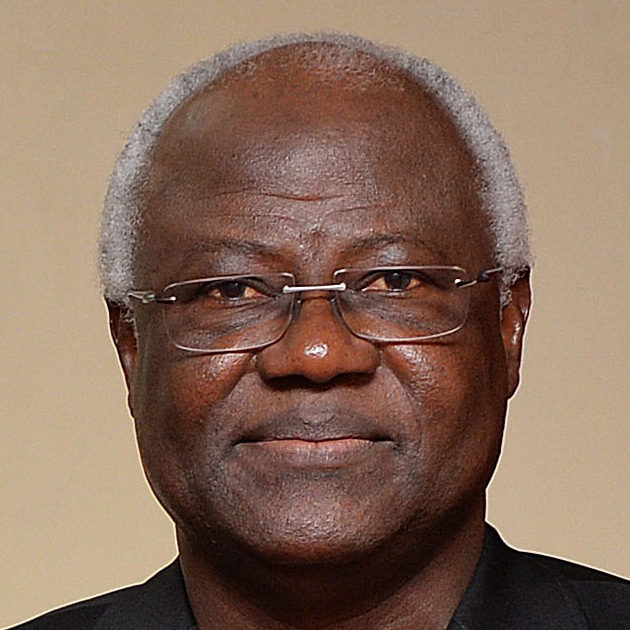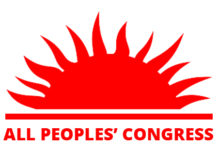
APC LEADERSHIP SUCCESSION: A POLITICAL RISK SCENARIO
By Mahmud Tim Kargbo
Potentially, stakeholders in Sierra Leone active in one of the biggest political parties ruled by an authoritarian ruler like former President Ernest Bai Koroma should gain a thorough understanding of potential “succession dilemmas” in order to be geared up to react to a variety of political risk scenarios that could affect their interests.
This article explores why former President Koroma’s regime type continues to make the All People’s Congress political party more exposed to succession risks and lines out the continuous negative impact that succession struggles may have on the All People’s Congress with Ernest Bai Koroma orchestrating the actions behind the scenes.
The former APC-led government of President Koroma is one political party where succession issues have been venomous and continue to pose a serious political risk soon, just as they did during his era. The country’s importance derives from its wealth in natural resources, notably iron ore, diamonds, gold, rutile, timber, bauxite, titanium, ilmenite, and recently oil and gas, etc., and its critical financial role in the West’s engagement in supporting regimes that are making it easy for them to loot our wealth successfully in collaboration with rogue rulers.
Ernest Bai Koroma is still playing politics as a one-man show.
For ten years and two weeks, Ernest Bai Koroma firmly ruled Sierra Leone in an authoritarian manner by narrowing the political landscape and making himself bigger.
The history of the “After You, Na You,” “More Time,” and “Chairman and Leader for Life” campaigns clearly exemplified the political risks that succession issues in fake democratic systems might entail. Already in 2015, then-President Koroma, through his irresponsible APC Youth Wing, attempted to extend his democratic mandate and thus contributed to a hostile climate in the country. Later, his handpicked successor, Mr. Samura Mathew Wilson Kamara, faced a violent internal uprising caused by popular discontent because of nepotism and corruption and was successfully sabotaged by former President Koroma himself as he ensured all critical political players within the party that had the knowledge and experience required for the APC’s victory in the 2018 general elections were fired or sidelined before and during the campaign process.
Fast forward to the 2023 presidential elections, and Ernest Bai Koroma again repeated his past actions and reimposed his 2018 presidential flagship aspirant as the APC presidential flagship aspirant. This time he did so after allowing his preferred presidential flagship aspirant to campaign throughout the country for five years, despite a press release from his party that restricted all interested party members eying for the All People’s Congress presidential flagship aspirant position to stop their campaigns until the party gets a presidential flagship aspirant in their convention. This means Ernest Bai Koroma’s preferred presidential flagship aspirant was given an unmerited political advantage to campaign, while others eying for the same position strictly could not engage in any political activities to sell their mandate within and beyond their party.
If we are to understand the implications of the succession issue for the political future of our country, it is crucial to look at what really characterises Ernest Bai Koroma’s regime type, namely authoritarian power mechanisms. Despite some formal legal, rational, and bureaucratic structures, all power was and still is derived directly from former President Koroma.
This is a political ruler who earned his legitimacy not from ideology and even less from democratic processes, but from a patriarchic cult of personality and effective patronage networks. In his patronage networks, then President Koroma exercised power by appointing people close to him, family and friends, to official positions in key ministries, state companies, agencies, or sovereign wealth funds, typically surrounding the rutile, discovered oil, diamond, iron ore, or bauxite industries, which they then used to advance his interests at the expense of the nation. Nepotism, corruption, sycophancy, bootlicking, and massive poverty were pervasive in his regime.
In exchange, privileged elite groupings supported his presidency, often by securing votes in their constituency as foundations and support groups and opposing anyone who threatened the president’s authority. Administrative and economic structures were built on the loyalty and dependencies of personal networks woven around former President Koroma.
As the contraption ruler, he used greed and rivalry within the elites to play different groups off against each other to strengthen his own position.
Former President Koroma was a proven master of balancing the interests of different elite groups in the country. The balance of power within his regime was extremely precarious, given that it hinged on the vitality and survival of a single ruler. This continues to make the question of succession to the then-autocratic ruler in his pseudo-democratic regime such a fundamental issue.
With no democratic institutions and established rules in place to secure a transparent and accountable transition of power from one elected government leader to the next, the risk of violent revolution or elite power struggles was always present in his pseudo-democratic regime.
THE APC “SUCCESSION DILEMMA”
Former President Koroma, as an authoritarian leader, was to a certain extent aware that his way of ruling within the APC Party and the country at large was based on favours and fear and that when fear is gone, there might be repercussions. Today, many believe one important goal for him was to secure favourable terms for himself and his relatives.
A very obvious succession strategy was the clear designation of a hand-picked successor by himself, which he repeated in the 2023 general elections. But others are saying this is not a very popular strategy either. So he allegedly made a safe deal with the then-main opposition SLPP Party leader.
One reason for the then-President’s reluctance to ensure his party succeeded him in governance might be what Robbins Burling called the “succession dilemma” in his 1974 book Passage of Power.
According to this concept, an authoritarian ruler will be reluctant to nominate a successor while he is still fit enough to rule because if he does, this would weaken his own position.
Elites would start responding to the second man, anticipating the imminent end of the incumbent. Political enemies of the incumbent would rally around the second in command, hoping to oust the former.
The leader in waiting might see his chance come to shorten the wait.
APC ELITES NEGOTIATIONS AND INFIGHTING
It is always the case that when an autocratic president leaves the stage and there is no clearly designated successor or the incumbent picks someone who is unacceptable to powerful forces within the elites, particularly if they believe that the new leader will not honour the established patronage arrangements, there will be negotiations about a successor between the different elite groupings.
In these negotiations, elite factions rally around potential successors, hoping to end up on the winning side. Negotiations can appear to be successful openly, but inwardly they are not, and they gave clean opportunities for the very deceitful and autocratic former President Koroma to succeed in his dangerous mission of dishonesty against political party comrades.
Sometimes, however, existing political cleavages between elite groups bear the risk of future infighting.
In the APC currently, the cleavage runs right between the family and friends of former President Koroma.
A faction of the rogue beneficiaries from the most important elite faction within the APC family surrounding Ernest Bai Koroma’s deceitful actions, others, mainly represent the new idea of reforming the party to meet the test of time, while long-time friends of Ernest Bai Koroma make up the old guard, mostly found in high administration offices during his corrupt regime.
The latter is supported by other groups, particularly the rationally minded youth and the oppressed majority during his regime, who favour genuine political party reforms from outside Ernest Bai Koroma and his family.
These two main elite factions have differing views on the APC’s future. While the business elite favours further economic and, hence, the political opening of the country to win genuine investors and move the country forward concretely, the old guard supports a more cautious approach.
Succession struggles threaten foreign stakeholders in two ways. Elite infighting after a ruler causes political volatility and unpredictability and bears the risk of violent clashes between the supporters of opposing factions.
Succession may cause new leadership that often goes hand in hand with a transformation of the overall elite structure. Foreign stakeholders must be careful not to become entangled in the succession struggle and be prepared to face a new leadership.
Stakeholders with a good relationship with the former ruler, for instance, or those suspected of having supported the losing side in the struggle, might be subject to reprisals.
A thorough analysis of our political landscape can help us make informed decisions based on various succession scenarios.




